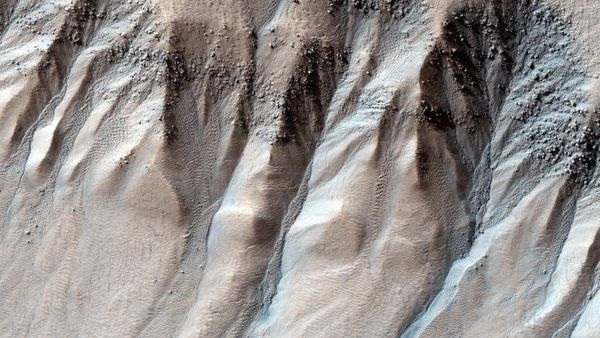On Monday, November 13, researchers revealed their ability to synthesize compounds from meteorites originating from Mars that could facilitate the extraction of oxygen from water.
Future manned missions to Mars will necessitate not only breathable air for astronauts but also a viable source of rocket fuel. By harnessing the resources available on the Martian surface to generate hydrogen, these missions can be made more cost-effective in the long term. This approach is far more practical than transporting large quantities of air and fuel-producing materials from Earth.
Given that water on Mars comprises hydrogen and oxygen, scientists have been exploring methods to extract hydrogen from the planet’s water ice reservoirs. The key lies in utilizing catalysts that can initiate chemical reactions to split water molecules, yielding oxygen and hydrogen fuel.
In a recent experiment, researchers tested various water-splitting catalysts using an AI scientist, notably employing materials sourced from Mars. The focus was on five distinct categories of Martian meteorites, fragments ejected from Mars by cosmic impacts and later found on Earth.
The AI scientist, equipped with a robotic arm, collected samples from the Martian meteorites and used lasers to analyze the composition. Through this process, it identified over 3.7 million atom combinations from six different elements present in the meteorites, including iron, nickel, magnesium, copper, and calcium.
Autonomously, the AI scientist selected, synthesized, and evaluated 243 different compounds within a span of six days. The most effective catalyst discovered by the robot could facilitate water splitting at a remarkably low temperature of 37 degrees Celsius (minus 34.6 degrees Fahrenheit), a feat unprecedented on Earth.
Co-senior author of the study, Professor Jun Jiang from the University of Science and Technology of China in Hefei, expressed his childhood aspiration for space exploration, stating that the realization of the AI robot’s ability to split water molecules felt like a dream come true. He even pondered the prospect of eventually residing on Mars.
While the research highlights the significant efficiency of AI in scientific endeavors, Jiang emphasized the complementary role of human expertise in guiding and refining the AI scientist’s capabilities. Teaching the AI system effectively hinges on human intervention and guidance.
Jiang also noted the need to assess the adaptability of the AI scientist to Martian conditions beyond temperature, considering factors such as atmospheric composition, air density, humidity, and gravitational pull, significantly distinct from those on Earth.
The comprehensive findings of the study were published online on Monday, November 13, in the journal Nature Synthesis.






